最新初中英语时态练习句子翻译_
- 格式:doc
- 大小:101.00 KB
- 文档页数:9
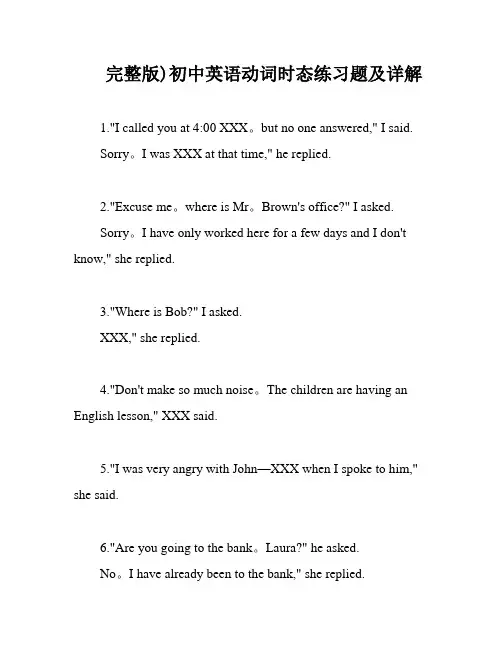
完整版)初中英语动词时态练习题及详解1."I called you at 4:00 XXX。
but no one answered," I said.Sorry。
I was XXX at that time," he replied.2."Excuse me。
where is Mr。
Brown's office?" I asked.Sorry。
I have only worked here for a few days and I don't know," she replied.3."Where is Bob?" I asked.XXX," she replied.4."Don't make so much noise。
The children are having an English lesson," XXX said.5."I was very angry with John—XXX when I spoke to him," she said.6."Are you going to the bank。
Laura?" he asked.No。
I have already been to the bank," she replied.7."Mr。
Black is going to marry a girl he met in Japan last year," she said.8.Many new houses have been built in Wenchuan with thehelp of the government this year.9.My grandmother has seen a lot of changes in Tianjin since she came here.10.The meeting had already begun by the time I got there yesterday.11.Yes。

初中八大时态加练习题及讲解-CAL-FENGHAI-(2020YEAR-YICAI)_JINGBIAN(一)一般现在时1、定义: 一般现在时表示现在经常反复发生的动作、存在的状态或习惯性的动作的时态。
常与时间状语often (经常),usually(通常),always(总是),every(每个),sometimes(有时),at …(在几点钟)等连用。
例句:I go to school at 6 every morning. 每天早上我七点去上学。
Summer follows spring. 春天之后是夏天。
The sun rises in the east. 太阳从东方升起。
I learned that the earth goes around the sun when I was in primary school. 我在小学就学过地球是围绕太阳转的。
Pride goes before a fall. 骄者必败。
2、构成:(基本结构:主语+动词原形(be动词/行为动词)+其他)1)当主语是第三人称单数时,行为动词需变形:a 人称代词主格宾格单数复数单数复数第一人称I We Me Us 第二人称You You You You 第三人称He They Him ThemShe They Her ThemIt They It Themb 行为动词变形情况构成方法读音例词一般情况加 -s 清辅音后读/s/浊辅音和元音后读/z/swim-swims;help-helps;like-likes以辅音字母+o结尾的词加 -es 读/z/ goes,does以s,sh,ch,x等结尾的词加 -es 读/iz/ watches,washes以辅音字母+y结尾的词变y 为i再加es 读/z/ study-studies不规则变化have和be动词变have 为 has变be为am,is,arehave-has be-am,is,are3)否定和疑问a 否定形式①be动词(am, is, are)+not;②在行为动词前加don’t/don’t Jack doesn’t like Chinese food at all. 杰克一点都不喜欢中国饮食。
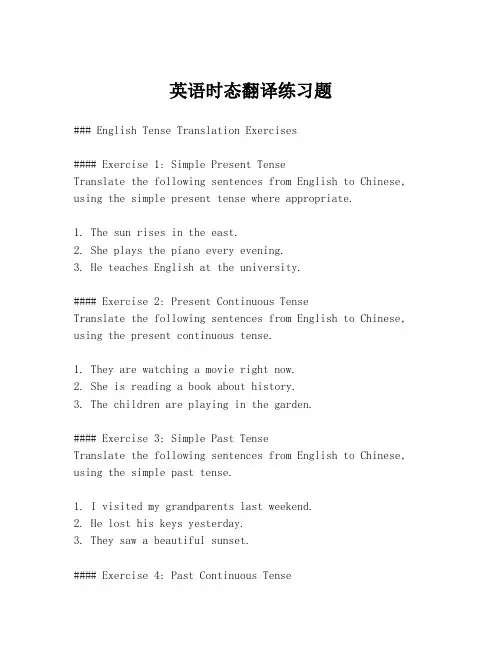
英语时态翻译练习题### English Tense Translation Exercises#### Exercise 1: Simple Present TenseTranslate the following sentences from English to Chinese, using the simple present tense where appropriate.1. The sun rises in the east.2. She plays the piano every evening.3. He teaches English at the university.#### Exercise 2: Present Continuous TenseTranslate the following sentences from English to Chinese, using the present continuous tense.1. They are watching a movie right now.2. She is reading a book about history.3. The children are playing in the garden.#### Exercise 3: Simple Past TenseTranslate the following sentences from English to Chinese, using the simple past tense.1. I visited my grandparents last weekend.2. He lost his keys yesterday.3. They saw a beautiful sunset.#### Exercise 4: Past Continuous TenseTranslate the following sentences from English to Chinese, using the past continuous tense.1. She was cooking when I arrived.2. They were having dinner when the phone rang.3. I was working on my project all night.#### Exercise 5: Simple Future TenseTranslate the following sentences from English to Chinese, using the simple future tense.1. We will go to the beach tomorrow.2. He will start a new job next week.3. They will meet us at the airport.#### Exercise 6: Future Continuous TenseTranslate the following sentences from English to Chinese, using the future continuous tense.1. She will be working when you arrive.2. They will be traveling around the world next year.3. I will be studying for my exams all day.#### Exercise 7: Present Perfect TenseTranslate the following sentences from English to Chinese, using the present perfect tense.1. I have finished my homework.2. He has worked here for five years.3. They have visited many countries.#### Exercise 8: Present Perfect Continuous TenseTranslate the following sentences from English to Chinese, using the present perfect continuous tense.1. She has been working here since 2010.2. He has been studying Chinese for three months.3. We have been waiting for you for an hour.#### Exercise 9: Past Perfect TenseTranslate the following sentences from English to Chinese, using the past perfect tense.1. By the time we arrived, the party had started.2. She had finished her homework before she went to the concert.3. He had lived in Paris for ten years before he moved to London.#### Exercise 10: Future Perfect TenseTranslate the following sentences from English to Chinese, using the future perfect tense.1. By next month, I will have finished my course.2. They will have completed the project by the end of the year.3. She will have traveled to five continents by the time she is 30.Please complete the exercises by providing the Chinesetranslations for each sentence. Remember to use the correct tense as indicated. Good luck with your practice!。
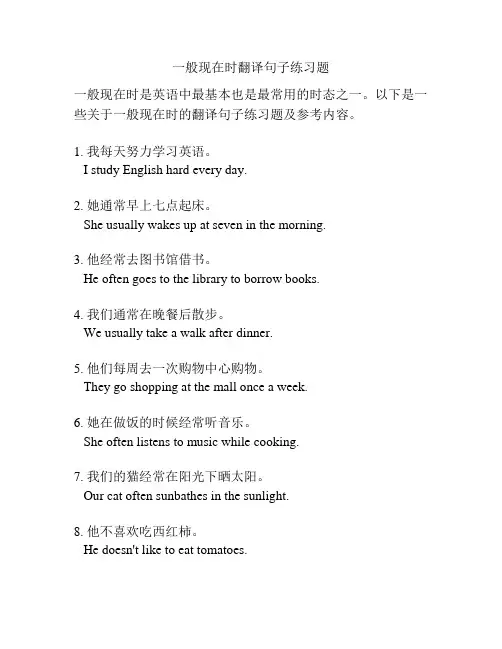
一般现在时翻译句子练习题一般现在时是英语中最基本也是最常用的时态之一。
以下是一些关于一般现在时的翻译句子练习题及参考内容。
1. 我每天努力学习英语。
I study English hard every day.2. 她通常早上七点起床。
She usually wakes up at seven in the morning.3. 他经常去图书馆借书。
He often goes to the library to borrow books.4. 我们通常在晚餐后散步。
We usually take a walk after dinner.5. 他们每周去一次购物中心购物。
They go shopping at the mall once a week.6. 她在做饭的时候经常听音乐。
She often listens to music while cooking.7. 我们的猫经常在阳光下晒太阳。
Our cat often sunbathes in the sunlight.8. 他不喜欢吃西红柿。
He doesn't like to eat tomatoes.9. 我们家的房子在一座小山的顶部。
Our house is located at the top of a small hill.10. 你常常去听音乐会吗?Do you often go to concerts?11. 他们每天都锻炼身体。
They exercise every day.12. 这个地方很美,我经常来这里散步。
This place is beautiful, I often come here for walks.13. 他总是迟到上班。
He is always late for work.14. 他们养了一只很可爱的小狗。
They have a cute little dog.15. 她每天都给家里打电话。
She calls home every day.16. 我们经常在周末去爬山。
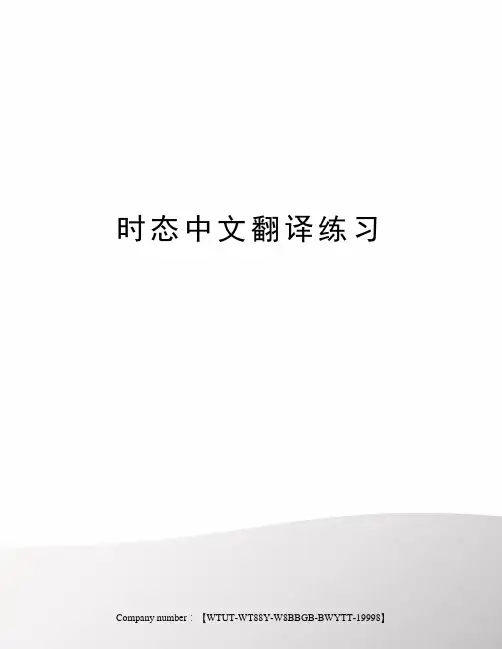
时态中文翻译练习 Company number:【WTUT-WT88Y-W8BBGB-BWYTT-19998】Put the following sentences into English using the simple present tense:1.他六点起床。
2.她每天工作八小时。
3.你经常洗头吗4.谢谢你。
我不抽烟。
5.你是做公共汽车上班,还是骑自行车上班6.你是来自哪里7.他是一名学生。
8.我的爸爸是一名老师。
9.他们是广东人。
(Cantonese)10.她懂得几国语言。
11.这汤味道很好。
(taste)12.他们喜欢滑冰。
(skating)13.太阳从东边升起。
14.地球绕着太阳转。
15.一年有四个季节:春、夏、秋、冬。
16.冬天经常下雪。
17.我喜欢音乐。
18.这个词是什么意思(mean)19.这本书包含五个部分。
(consist of)20.这似乎是个好主意。
21.一切我们都得归公于你。
(owe everything to sb.)22.飞机早上九点二十分起飞。
(take off)23.戏几点开始(play)24.你今晚有空吗25.如果我见到她, 我会告诉她。
(if)26.我们见面时我将和你商讨此事。
(discuss)27.你走之后我会告诉他。
(after)28.你一到我们就告诉你。
(as soon as)29.除非她先来信,否则我不会给她写信。
(unless)30.如果我父母亲明天有空,我们会去野炊。
(go for a picnic)31.不管花多少钱我都得把我的车修好。
(no matter how much)Put the following sentences into English using the simple past tense:1.她昨晚哪儿都不去。
2.当我很小的时候,我就经常打篮球。
3.上个圣诞节,她给了我一个礼物。
(Christmas)4.上个星期天他们去了公园。
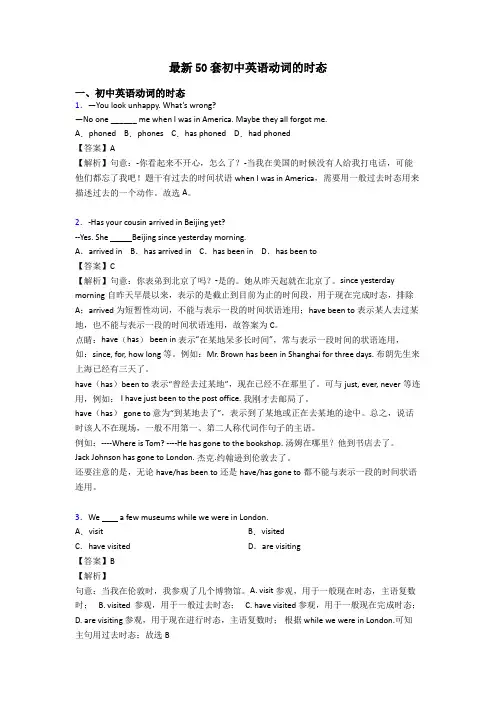
最新50套初中英语动词的时态一、初中英语动词的时态1.—You look unhappy. What’s wrong?—No one ______ me when I was in America. Maybe they all forgot me.A.phoned B.phones C.has phoned D.had phoned【答案】A【解析】句意:-你看起来不开心,怎么了?-当我在美国的时候没有人给我打电话,可能他们都忘了我吧!题干有过去的时间状语when I was in America,需要用一般过去时态用来描述过去的一个动作。
故选A。
2.-Has your cousin arrived in Beijing yet?--Yes. She Beijing since yesterday morning.A.arrived in B.has arrived in C.has been in D.has been to【答案】C【解析】句意:你表弟到北京了吗?-是的。
她从昨天起就在北京了。
since yesterday morning自昨天早晨以来,表示的是截止到目前为止的时间段,用于现在完成时态,排除A;arrived为短暂性动词,不能与表示一段的时间状语连用;have been to表示某人去过某地,也不能与表示一段的时间状语连用,故答案为C。
点睛:have(has) been in 表示“在某地呆多长时间”,常与表示一段时间的状语连用,如:since, for, how long 等。
例如:Mr. Brown has been in Shanghai for three days. 布朗先生来上海已经有三天了。
have(has)been to表示“曾经去过某地”,现在已经不在那里了。
可与just, ever, never等连用,例如: I have just been to the post office. 我刚才去邮局了。
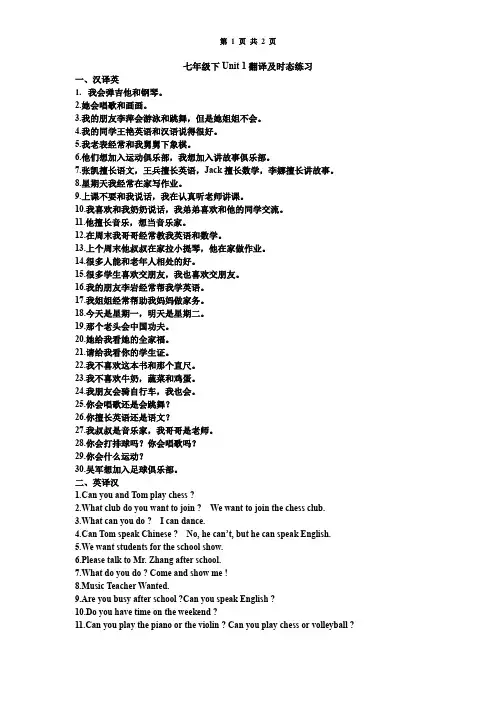
七年级下Unit 1翻译及时态练习一、汉译英1.我会弹吉他和钢琴。
2.她会唱歌和画画。
3.我的朋友李萍会游泳和跳舞,但是她姐姐不会。
4.我的同学王艳英语和汉语说得很好。
5.我老表经常和我舅舅下象棋。
6.他们想加入运动俱乐部,我想加入讲故事俱乐部。
7.张凯擅长语文,王兵擅长英语,Jack擅长数学,李娜擅长讲故事。
8.星期天我经常在家写作业。
9.上课不要和我说话,我在认真听老师讲课。
10.我喜欢和我奶奶说话,我弟弟喜欢和他的同学交流。
11.他擅长音乐,想当音乐家。
12.在周末我哥哥经常教我英语和数学。
13.上个周末他叔叔在家拉小提琴,他在家做作业。
14.很多人能和老年人相处的好。
15.很多学生喜欢交朋友,我也喜欢交朋友。
16.我的朋友李岩经常帮我学英语。
17.我姐姐经常帮助我妈妈做家务。
18.今天是星期一,明天是星期二。
19.那个老头会中国功夫。
20.她给我看她的全家福。
21.请给我看你的学生证。
22.我不喜欢这本书和那个直尺。
23.我不喜欢牛奶,蔬菜和鸡蛋。
24.我朋友会骑自行车,我也会。
25.你会唱歌还是会跳舞?26.你擅长英语还是语文?27.我叔叔是音乐家,我哥哥是老师。
28.你会打排球吗?你会唱歌吗?29.你会什么运动?30.吴军想加入足球俱乐部。
二、英译汉1.Can you and Tom play chess ?2.What club do you want to join ? We want to join the chess club.3.What can you do ? I can dance.4.Can Tom speak Chinese ? No, he can’t, but he can speak English.5.We want students for the school show.6.Please talk to Mr. Zhang after school.7.What do you do ? Come and show me !8.Music Teacher Wanted.9.Are you busy after school ?Can you speak English ?10.Do you have time on the weekend ?11.Can you play the piano or the violin ? Can you play chess or volleyball ?三、用所给动词的正确形式填空1. Look ! They ________________ (fly) a kite in the park .2. Listen! The old man ______________ (sing ) in the music classroom .3. We _________________ (watch) TV now .4. Last week they _________________ (go) to Beijing .5. Last weekend the students ______________ (go) on the school trip .6.The people on the farm ________________ ( milk ) a cow yesterday.7. ----_____ Tom __________ (take) any photos ? ---- Yes, he did.8. How _______ (be) your school trip ?9.My sister ________________ (finish) high school two weeks ago .st weekend _________________(be) interesting but scary.11.Our parents ___________(take) us to a small village in India.12.They ____________ (see) a big snake sleeping near the fire just now.13.I _____________(buy) a car yesterday, my dad _______(buy) a bike.14. I ____________(have) a busy weekend .15.On Sunday morning the boy _______(help) his dad ________(clean) the car .16.He usually _________(take) a bus to school .17.She ___________(climb) a mountain on Sundays .18.His aunt __________(sing) every day .19.Sometimes she ___________(eat) breakfast at 7:00 .20.______ (be) there a post office near here ?21.Tom _______(be) five years old .22.She ______________(not swim) alone in the river on the weekend .23.The girl _________(live) in a noisy neighborhood .24.I ________(enjoy) reading in the library .25.Where _________(be) the bank ? Can you _______(tell) me ?26.How _______(be) it going ?27.I am __________(sit) by the pool and ________(drink) orange juice.28.The weather here ________(be) cool and cloudy . It’s just right for ______(walk).29.They __________(play) basketball with some friends at the park .30.He __________(talk) on the phone to his cousin in Shenzhen .31.We want to __________(see) tigers .32.The children _____________(like) animals.33.The girls _____________(have) long curly brown hair .34.I think today’s school trip _________(be) terrible .35.What _______ you ____________(do) last weekend ?36.On Saturday morning we __________(play) badminton .37.They ___________(go) boating last month .38.The people often _________(relax) in the beach .39.He never _________(arrive) late for school .40.Today ______(be) Sunday, tomorrow _____(be) Monday, yesterday ___(be) Tuesday.41.We __________(have) breakfast at 6:00 in the morning .42.Jack __________(camp) by the lake last night .43.The students _____________(read) English and Chinese every morning .。
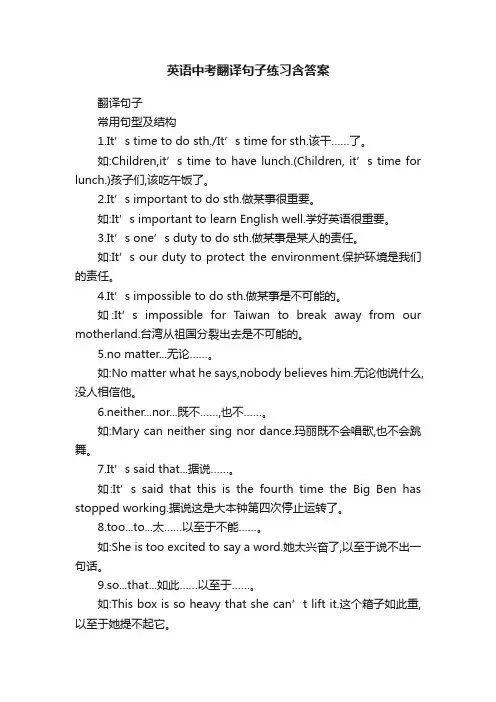
英语中考翻译句子练习含答案翻译句子常用句型及结构1.It’s time to do sth./It’s time for sth.该干……了。
如:Children,it’s time to have lunch.(Children, it’s time for lunch.)孩子们,该吃午饭了。
2.It’s important to do sth.做某事很重要。
如:It’s important to learn English well.学好英语很重要。
3.It’s one’s duty to do sth.做某事是某人的责任。
如:It’s our duty to protect the environment.保护环境是我们的责任。
4.It’s impossible to do sth.做某事是不可能的。
如:It’s impossible for Taiwan to break away from our motherland.台湾从祖国分裂出去是不可能的。
5.no matter...无论……。
如:No matter what he says,nobody believes him.无论他说什么,没人相信他。
6.neither...nor...既不……,也不……。
如:Mary can neither sing nor dance.玛丽既不会唱歌,也不会跳舞。
7.It’s said that...据说……。
如:It’s said that this is the fourth time the Big Ben has stopped working.据说这是大本钟第四次停止运转了。
8.too...to...太……以至于不能……。
如:She is too excited to say a word.她太兴奋了,以至于说不出一句话。
9.so...that...如此……以至于……。
如:This box is so heavy that she can’t lift it.这个箱子如此重,以至于她提不起它。
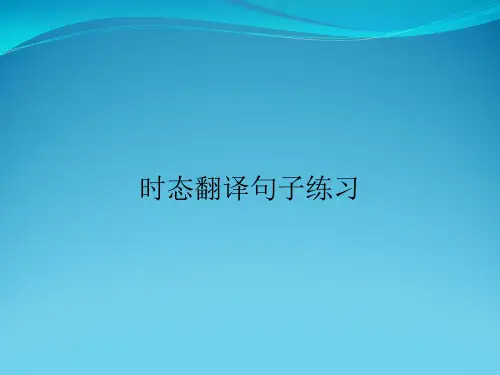
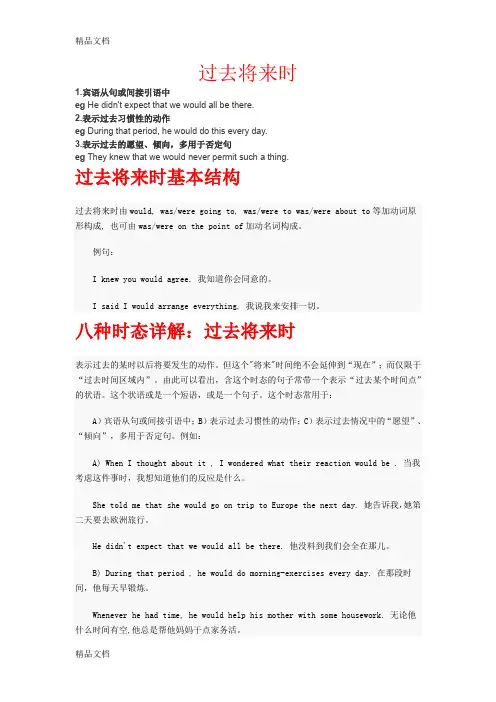
过去将来时1.宾语从句或间接引语中eg He didn't expect that we would all be there.2.表示过去习惯性的动作eg During that period, he would do this every day.3.表示过去的愿望、倾向,多用于否定句eg They knew that we would never permit such a thing.过去将来时基本结构过去将来时由would, was/were going to, was/were to was/were about to等加动词原形构成, 也可由was/were on the point of加动名词构成。
例句:I knew you would agree. 我知道你会同意的。
I said I would arrange everything. 我说我来安排一切。
八种时态详解:过去将来时表示过去的某时以后将要发生的动作。
但这个"将来"时间绝不会延伸到“现在”;而仅限于“过去时间区域内”。
由此可以看出,含这个时态的句子常带一个表示“过去某个时间点”的状语。
这个状语或是一个短语,或是一个句子。
这个时态常用于:A)宾语从句或间接引语中;B)表示过去习惯性的动作;C)表示过去情况中的“愿望”、“倾向”,多用于否定句。
例如:A) When I thought about it , I wondered what their reaction would be . 当我考虑这件事时,我想知道他们的反应是什么。
She told me that she would go on trip to Europe the next day. 她告诉我,她第二天要去欧洲旅行。
He didn't expect that we would all be there. 他没料到我们会全在那儿。
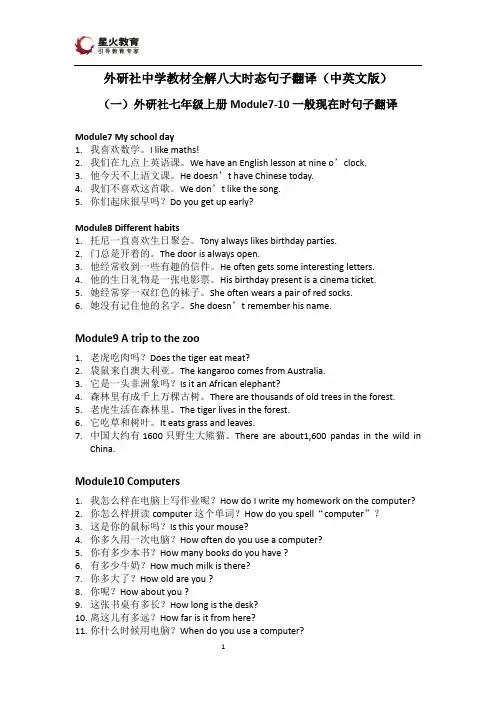
外研社中学教材全解八大时态句子翻译(中英文版)(一)外研社七年级上册Module7-10一般现在时句子翻译Module7 My school day1.我喜欢数学。
I like maths!2.我们在九点上英语课。
We have an English lesson at nine o’clock.3.他今天不上语文课。
He doesn’t have Chinese today.4.我们不喜欢这首歌。
We don’t like the song.5.你们起床很早吗?Do you get up early?Module8 Different habits1.托尼一直喜欢生日聚会。
Tony always likes birthday parties.2.门总是开着的。
The door is always open.3.他经常收到一些有趣的信件。
He often gets some interesting letters.4.他的生日礼物是一张电影票。
His birthday present is a cinema ticket.5.她经常穿一双红色的袜子。
She often wears a pair of red socks.6.她没有记住他的名字。
She doesn’t remember his name.Module9 A trip to the zoo1.老虎吃肉吗?Does the tiger eat meat?2.袋鼠来自澳大利亚。
The kangaroo comes from Australia.3.它是一头非洲象吗?Is it an African elephant?4.森林里有成千上万棵古树。
There are thousands of old trees in the forest.5.老虎生活在森林里。
The tiger lives in the forest.6.它吃草和树叶。
It eats grass and leaves.7.中国大约有1600只野生大熊猫。
时态翻译练习
1. Lucy每天晚上八点回家
2. Mike上周去了上海
3. Jim昨天给我写了一封邮件
4. 我正在学英语
5. Mike已经(already)完成了今天的工作
6. 我已经告诉过Lucy这个消息
7. 昨天你来的时候,我们正在吃晚饭
8. 幸运的是(luckily),我们昨天在下雨前到家了
9. 张华说他的笔记本丢了
10. 我明年十四岁
11. 火车快要到了
12. 我六点要到火车站去接Tom
13. 你什么时候可以完成你的工作?
14. 我认为明天不会下雨
15. 太阳正在从东方升起(rise)
16. 牛奶要变质(go bad)了
17. 他过去每天跑步
18. 昨天晚上我看了一部电影
19. 如果明天下雨,我们就不去公园
20. 我已经等了他二十分钟了
21.我们吃饭的时候,灯灭了(go out)
22. 她给你打电话的时候,你在干什么?
23. 看啊!孩子们正在高兴地玩。
24. 我昨天下午两点在睡觉。
25. 电影已经开始几分钟了他才到电影院。
…………………………………………………………最新精品资料推荐…………………………………………………… …………………………………………………………最新精品资料推荐……………………………………………………1 一.翻译下列各句: 1稍等一会儿,我会帮助你的。(for a while) 2他们作了自我介绍。(introduce) 3请去查询下班火车什么时候开。(find out) 4昨天下午2时到4时你在做什么?(过去进行时) 5我正在吃晚饭,电话铃响了。(when) 6不仅我,而且汤姆和玛丽都喜欢游泳。(be fond of) 7他今天感到身体好多了。(a lot) 8礼堂里早已挤满了高中学生。(be full of) 9我在街上走时,看到了一些古老的建筑物。(while) 10我走近花园时,几个男孩子在爬树。(用过去进行时) 二.单选: 1. – Jack? -- ____. A. Present, Sir. B. I am, Sir C. Here, Sir D. Yes, Sir. 2. ---What are you busy with ? --- We are carrying out a research ____ the causes of cancer. A. into B. onto C. to D. in 3. ---____ the paper ? --- No, I have still got one page to finish. A. Have you done B. Do you do C. Did you do D. Had you done 4. _____ in all parts of the state, pines are the most common trees in Georgia . A. Found B. Finding them C. To find them D. They are found 5. They ___ the game. A. are disappointed at losing B. disappoint C. are disappointing D. are disappointed 6. – Will it rain tomorrow? -- No. I don’t doubt ________. A. whether it will rain B. that it will rain C. whether it rains D. that it rains 7. Jasper is a great painter. He is _____ Picasso. A. as a great as B. as great painter as C. as great a painter as D. so great a painter as 8. The great use of the school education is not so much to teach you things _____ to teach the art of learning. A. rather than B. than C. nor D. as 9. Travelling from England to Scotland you _______. A. needn’t a passport B. don’t need to have a passport C. needn’t to take a passport D. don’t need take a passport 10. The radio doesn’t work well; it needs_________. A. fixing B. being fixed C. to fix D. fixed 11. – I was trying to repair that stupid machine, but I failed. -- Well, you_______. A. needn’t do that B. needn’t have done C. needn’t have D. needn’t 12. The children had _____basketball. …………………………………………………………最新精品资料推荐…………………………………………………… …………………………………………………………最新精品资料推荐……………………………………………………2 A. a great fun playing B. great fun playing C. great fun to play D. a great funny playing 13. _____it is to jump into the water in hot summer! A. What fun B. How funny C. What a fun D. How fun 14. He has done a job which is _____as the one I have done. A. as well B. as good C. as better D. so best 15. The news finally came, which _____them all! A. disappoints B. disappointing C. disappointed D. disappoint AAAAA BCDBA CBABC 动词及动词时态 实义动词 1) 及物动词 a.动词后要求有宾语,否则意思不完整的动词。及物动词可有被动结构。 1.She studies English very hard. 2.I always review my lessons in the evening.
b. 及物动词的另两种结构 及物动词中有少数动词要求一个宾语(直接宾语)外,还要求有一个宾语(间接宾语),才使句意完整。这类动词有:leave, show, bring, lend, teach, give, tell, hand, write等。 I’ll tell you a story about Leifeng. 还有少数动词要求一个宾语外,还要求有一个补足语来使句意完整。这类动词有:name, call, get, have, find, turn, think, consider等。 They call him Lao Wang. 2) 不及物动词 不及物动词指不可带宾语的动词,也不可用于被动语态。 1. The sun rises in the east. 2. He came last month. 3. They go to school every day. 3)连系动词 连系动词只起连系作用,虽有词义但不能单独作谓语,后必须加表语一起构成谓语。 常用的连系动词有: appear, become, fall, feel, get, go, grow, keep, look, remain, seem, smell, sound, stay, taste, turn等。 1. She felt a bit tired. 2. He kept silent at the meeting. 注:连系动词不可与副词连用。 时态 1) 一般现在时 用法: 1.经常性动作等。常与everyday, often, always, once a week, seldom, usually等连用。 She is our teacher of English. 2.真理和事实。 …………………………………………………………最新精品资料推荐…………………………………………………… …………………………………………………………最新精品资料推荐……………………………………………………3 Light travels faster than sound. 3.有计划的动作,常用go, come, start, leave, arrive, return等动词。 I leave for Beijing next Monday. 4.代替一般将来时,在由when, if, before, as soon as, unless等引导的时间,条件状语从句中,用一般现在时代替一般将来时。 When I grow up I shall be a soldier. 5.动作正在发生,用在由here, there等开首的句子中,表示现在正在发生。 There goes the bell. 6.表示主语的习惯特征,性格,能力等。 He studies very hard. 7.一般的说明文字等。 The book says that women can live longer than men. 2)一般过去时 1.表示过去的某个时间发生的动作或存在的状态,常和明确的时间状语连用。 She went out just now. I saw him yesterday. 2.表示过去经常发生的动作。 Last month she worked eleven hours every day. He used to get up early. 3)一般将来时 1.表示将来发生的动作或存在的状态。 I shall not be free tonight. 2.表示将来经常发生的动作。 We will go for an outing every other week. 3.表示将来动作的其他形式 a. be going to+ 动词原形 b. be to+动词原形 c. be about(around/sure/certain//due/bound) to+动词原形 4)过去将来时 1.表示在过去将来的某一时间发生的动作或存在的状态。 I didn’t expect that so many people would offer their help. 2.也可用was/were to+动词原形或was/were about to+动词原形或was/were going to+动词原形表示过去将来时。 I was about to leave when the telephone rang. 5)现在进行时 1.表示正在进行的动作。 What are you doing now? 2.表示即将发生的动作. She is leaving tomorrow. 3.表示现阶段正在进行的动作. More and more people are giving up smoking. 4.表示反复发生的或习惯性的动作,常表示不满,抱怨,赞赏等.